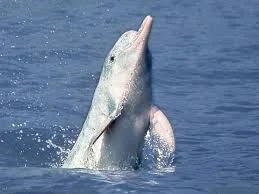We didn't do it on porpoise
August 9, 2007
SO FAREWELL then, the baiji dolphin. "So long and thanks for all the chemical effluent."
An international team of scientists sent to patrol the creature's only habitat - the cluttered and contaminated middle reaches of the Yangtze River - have concluded that it no longer exists. Their last-gasp effort to find a refuge for the beleaguered baiji came just a little too late.
It is still possible, as botanists in China have done, to grasp at straws. An expert with China's Academy of Sciences rightly pointed out that it is not quite accurate to say that the baiji is extinct: it takes about fifty years to make that declaration with confidence.
But although there are some "lazarus species" that have reappeared after being declared dead, including such marvellous creatures as the Lord Howe Island stick insect, and the splendid woolly flying squirrel, no one is holding out much hope for the Lepotes Vexillifer, and the best thing they can say is that it is "functionally extinct". That is to say that there may well be some surviving members of the species choking on the filthy, eutrophicated water, desperately trying to echolocate from within a cacophony of horns and engines, and frantically avoiding barge propellers in the struggle to find space and nourishment. However, it is unlikely that they will be capable of creating a viable economy in such a devastated environment, which is why the scientists wanted to intervene in the first place.
The team who made the trip down the Yangtze last Autumn surveyed every last square inch of the river and employed special equipment to detect any sonar SOS from the dolphins. They found nothing, and are convinced that we have now seen the last of the rare marine mammal. The way the development of the Yangtze is going, we wouldn't even be surprised to hear that the pigs have also been wiped out.
The baijitun (literally the white-finned pig), as it should be known, evolved over millions of years to best deal with the environment of the Yangtze. Unfortunately, it took only a geological heartbeat - and an unusually dominant species - to render that environment completely uninhabitable.
Shockingly, the Communist Party functionaries behind the Great Leap Forward even claimed that the protection of the dolphin was a backward, bourgeois superstition that needed to be eradicated, but we should not pretend that this is a uniquely Chinese matter derived from a uniquely Chinese perspective about the conquest of nature.
Ever since we rose on our hind legs and marched from ancestral Africa, we left thousands of species in our wake, beginning with the superfauna of North America and Australasia and reaching an apogee of awfulness in the mass culling of the American bison, the passenger pigeon (extinct) and the Carolina parakeet (extinct), as well as the U.S. extermination campaigns against bears, wolves, mountain lions and raptors.




